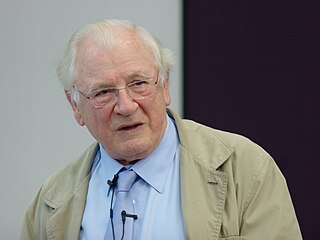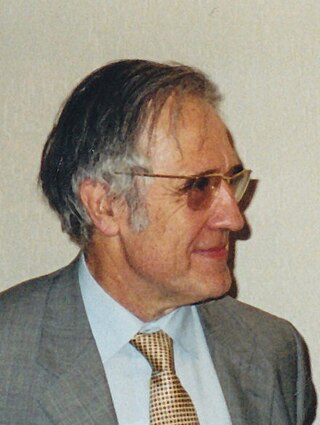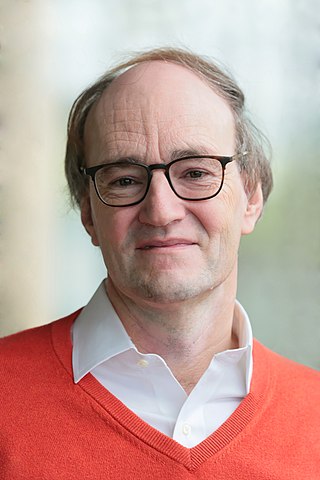Planner is a programming language designed by Carl Hewitt at MIT, and first published in 1969. First, subsets such as Micro-Planner and Pico-Planner were implemented, and then essentially the whole language was implemented as Popler by Julian Davies at the University of Edinburgh in the POP-2 programming language. Derivations such as QA4, Conniver, QLISP and Ether were important tools in artificial intelligence research in the 1970s, which influenced commercial developments such as Knowledge Engineering Environment (KEE) and Automated Reasoning Tool (ART).

Douglas Bruce Lenat was an American computer scientist and researcher in artificial intelligence who was the founder and CEO of Cycorp, Inc. in Austin, Texas.
E is a high-performance theorem prover for full first-order logic with equality. It is based on the equational superposition calculus and uses a purely equational paradigm. It has been integrated into other theorem provers and it has been among the best-placed systems in several theorem proving competitions. E is developed by Stephan Schulz, originally in the Automated Reasoning Group at TU Munich, now at Baden-Württemberg Cooperative State University Stuttgart.

Dabbala Rajagopal "Raj" Reddy is an Indian-American computer scientist and a winner of the Turing Award. He is one of the early pioneers of artificial intelligence and has served on the faculty of Stanford and Carnegie Mellon for over 50 years. He was the founding director of the Robotics Institute at Carnegie Mellon University. He was instrumental in helping to create Rajiv Gandhi University of Knowledge Technologies in India, to cater to the educational needs of the low-income, gifted, rural youth. He was the founding chairman of International Institute of Information Technology, Hyderabad. He was the first person of Asian origin to receive the Turing Award, in 1994, sometimes known as the Nobel Prize of computer science, for his work in the field of artificial intelligence.
In artificial intelligence, symbolic artificial intelligence is the term for the collection of all methods in artificial intelligence research that are based on high-level symbolic (human-readable) representations of problems, logic and search. Symbolic AI used tools such as logic programming, production rules, semantic nets and frames, and it developed applications such as knowledge-based systems, symbolic mathematics, automated theorem provers, ontologies, the semantic web, and automated planning and scheduling systems. The Symbolic AI paradigm led to seminal ideas in search, symbolic programming languages, agents, multi-agent systems, the semantic web, and the strengths and limitations of formal knowledge and reasoning systems.
In the field of artificial intelligence, an inference engine is a software component of an intelligent system that applies logical rules to the knowledge base to deduce new information. The first inference engines were components of expert systems. The typical expert system consisted of a knowledge base and an inference engine. The knowledge base stored facts about the world. The inference engine applied logical rules to the knowledge base and deduced new knowledge. This process would iterate as each new fact in the knowledge base could trigger additional rules in the inference engine. Inference engines work primarily in one of two modes either special rule or facts: forward chaining and backward chaining. Forward chaining starts with the known facts and asserts new facts. Backward chaining starts with goals, and works backward to determine what facts must be asserted so that the goals can be achieved.

Scott Elliott Fahlman is an American computer scientist and Professor Emeritus at Carnegie Mellon University's Language Technologies Institute and Computer Science Department. He is notable for early work on automated planning and scheduling in a blocks world, on semantic networks, on neural networks, on the programming languages Dylan, and Common Lisp, and he was one of the founders of Lucid Inc. During the period when it was standardized, he was recognized as "the leader of Common Lisp." From 2006 to 2015, Fahlman was engaged in developing a knowledge base named Scone, based in part on his thesis work on the NETL Semantic Network. He also is credited with coining the use of the emoticon.
Patrick John Hayes is a British computer scientist who lives and works in the United States. He is a Senior Research Scientist Emeritus at the Institute for Human and Machine Cognition (IHMC) in Pensacola, Florida.

Alan Richard Bundy is a professor at the School of Informatics at the University of Edinburgh, known for his contributions to automated reasoning, especially to proof planning, the use of meta-level reasoning to guide proof search.

Pierre Lévy is a Tunisian-born French philosopher, cultural theorist and media scholar who specializes in the understanding of the cultural and cognitive implications of digital technologies and the phenomenon of human collective intelligence.

John Alan Robinson was a philosopher, mathematician, and computer scientist. He was a professor emeritus at Syracuse University.
Richard Jay Waldinger is a computer science researcher at SRI International's Artificial Intelligence Center whose interests focus on the application of automated deductive reasoning to problems in software engineering and artificial intelligence.

Paul Gochet was a Belgian logician, philosopher, and emeritus professor of the University of Liège. His research was mainly in the fields of logic and analytic philosophy. He is perhaps best known for his works on Quine's philosophy.

Leonhard Wolfgang Bibel is a German computer scientist, mathematician and Professor emeritus at the Department of Computer Science of the Technische Universität Darmstadt. He was one of the founders of the research area of artificial intelligence in Germany and Europe and has been named as one of the ten most important researchers in German artificial intelligence history by the Gesellschaft für Informatik. Bibel established the necessary institutions, conferences and scientific journals and promoted the necessary research programs to establish the field of artificial intelligence.
Henri Martre was a French telecommunications engineer. He headed both the Délégation générale pour l'armement, the aerospace conglomerate Aérospatiale and the French Aerospace Industries Association (GIFAS). He was considered one of the main promoters in France of "competitive intelligence".

Nicholas Robert Jennings is a British computer scientist who was appointed Vice-Chancellor and President of Loughborough University in 2021. He was previously the Vice-Provost for Research and Enterprise at Imperial College London, the UK's first Regius Professor of Computer Science, and the inaugural Chief Scientific Adviser to the UK Government on National Security. His research covers the areas of AI, autonomous systems, agent-based computing and cybersecurity.
John Mylopoulos is a Greek-Canadian computer scientist, Professor at the University of Toronto, Canada, and at the University of Trento, Italy. He is known for his work in the field of conceptual modeling, specifically the development an agent-oriented software development methodology. called TROPOS.
Henry A. Kautz is a computer scientist, Founding Director of Institute for Data Science and Professor at University of Rochester. He is interested in knowledge representation, artificial intelligence, data science and pervasive computing.

Boi Volkert Faltings is a Swiss professor of artificial intelligence at École Polytechnique Fédérale de Lausanne.
Didier Guzzoni is a Swiss computer scientist and senior software engineer with the Apple's Siri team. He was a founding member and chief scientist at the start-up company Siri Inc. that was later acquired be Apple Inc.









